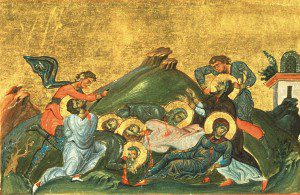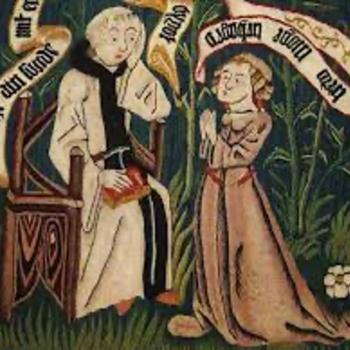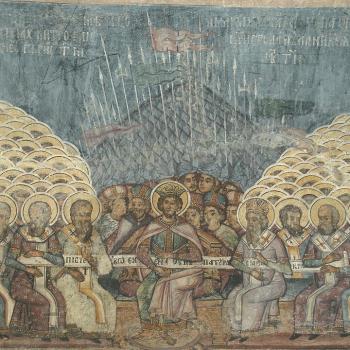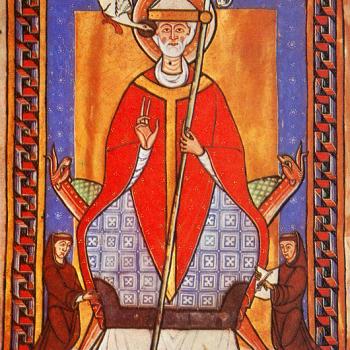Jesus warned that those who wanted to be his disciples would have to take up their crosses and follow him, at the risk of losing their lives. During Holy Week, Christians rightfully focus their meditations and prayers on the passion of their Savior, but especially at this time it seems appropriate for us to remember the passions of Christ’s many saints through the centuries since his death and resurrection.
Writing for the Boston Globe, John Allen recently reported on the murder of Dutch Jesuit priest Frans van der Lugt, the last westerner in Homs, Syria. Van der Lugt served his Lord at a center for mentally and physically disabled persons, dispensing mercy and charity to those around him as best he could. Last week, an unknown attacker dragged him from his Jesuit residence into the street, beat van der Lugt, and fatally shot him.
Allen reminds us — rightfully, as we living in comfort too quickly forget — that in Egypt, Syria, Iraq, Eritrea, North Korea, and elsewhere, Christians routinely lose their lives because of their faith. We live in an age of anti-Christian persecution and Christian martyrdom. Sadly, many faithful believers are indeed experiencing the physical trials predicted by Jesus.
One of the most famous accounts of martyrdom in the history of Christian literature is The Passion of Saints Perpetua and Felicity. Perpetua was a young, educated noblewoman and mother in Carthage, a North African city with a growing Christian population. It was the turn of the third century, during the reign of the emperor Septimius Severus. The exact circumstances and motivations are unclear, but it seems that a provincial governor decided to arrange the execution of Christians in Carthage in honor of the birthday of the emperor’s son. [For my information, I have relied on books by Joyce Salisbury and William Tabbernee].

Perpetua was a Christian catechumen, a follower of Jesus not yet baptized. Perpetua’s father pleaded with her to renounce her faith. “I cannot call myself anything other than what I am,” she responded, “a Christian.” Perpetua was baptized. A few days later, she was sent to the dungeon. “I was very much afraid,” she wrote, “because I had never felt such darkness.” Furthermore, she also had to weigh her love for Jesus against her devotion toward her still-nursing son, who intermittently stayed with her in jail. Perpetua was brought before a tribunal. “Spare the grey hairs of your father,” encouraged the Roman procurator, “spare the infancy of your boy, offer sacrifice for the well-being of the emperors.” “I will not do so,” she replied, “…I am a Christian.” Despite the pressure of her family, she remained stalwart in her new faith and was eventually taken with a group of condemned Christians to the amphitheater for her execution.
An unknown editor (not Tertullian, as was once presumed) preserved the journals of Perpetua and Saturus during their imprisonment. Most scholars accept the authenticity at least of Perpetua’s account. In it, Perpetua’s brother implores her to ask for a vision that will reveal whether her experience will “be a passion or else a deliverance.” She followed his advice and saw a ladder of bronze reaching to heaven. Saturus first, and then Perpetua, climb the ladder. She relates:
And I went up, and I saw a very great space of garden, and in the midst a man sitting, white-headed, in shepherd’s clothing, tall milking his sheep; and standing around in white were many thousands. And he raised his head and beheld me and said to me: Welcome, child. And he cried to me, and from the curd he had from the milk he gave me as it were a morsel; and I took it with joined hands and ate it up; and all that stood around said, Amen. And at the sound of that word I awoke, yet eating I know not what of sweet.
Perpetua knew that she would die. She “began to have no hope any longer in this world,” but the vision strengthened her for her coming ordeal. Over the coming days, she received more visions, in dreams. Saturus also was comforted by visions.
They would need that comfort, as the editor of the journals includes a brutal and graphic account of their deaths in the Carthage amphitheater. After being whipped, they were attacked by wild beasts and then put to death by the sword. Perpetua was the last to die: “Perpetua, that she might have some taste of pain, was pierced between the bones and shrieked out; and when the swordsman’s hand wandered still (for he was a novice), herself set it upon her own neck. Perchance so great a woman could not else have been slain (being feared of the unclean spirit) had she not herself so willed it.”
The editor of The Passion of Saints Perpetua and Felicity ended with his contention that these new witnesses were “no less than the old, unto the Church’s edification; that these new wonders also may testify that one and the same Holy Spirit works ever until now, and with Him God the Father Almighty, and His Son Jesus Christ Our Lord.”
I do not believe that all Christians should expect personal manifestations of the godhead, nor do I believe that visionary leadership would provide a stable basis for congregational or broader ecclesiastical polity. At the same time, Christians have little basis to reject the idea that some of us are blessed with such visions and dreams. Our scriptures teach us that Paul and John of Patmos saw and heard the Savior. Visions of the divine seem intended for conversion, comfort, and edification. In Perpetua’s case, her vision of the good shepherd welcoming her to heaven provided some sweet comfort in light of her coming humiliation and execution.
At a time when Christians in several countries face intense persecution and the loss of their lives, we might pray that should their lives not be spared, God would grant them comfort akin to Perpetua’s as they join her in earthly martyrdom and eternal life.












